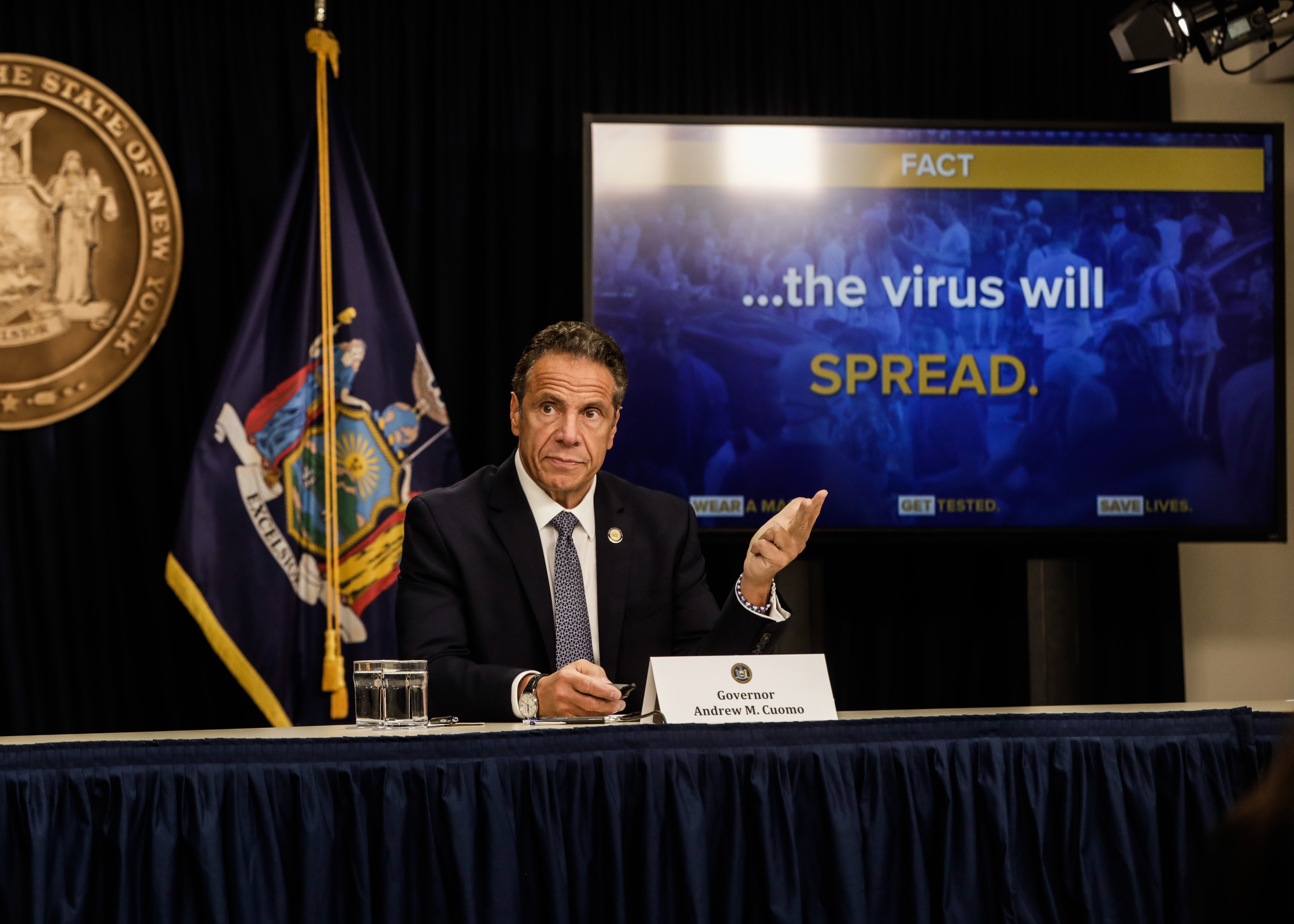
New York Gov. Andrew Cuomo on Monday outlined the criteria to reopen school districts closed this fall, stressing that he wants to keep kids safe: “We’re not going to use our children as guinea pigs.”
President Donald Trump has been pressing for schools to reopen in the fall, threatening to cut funding to school districts that don’t.
School reopenings will be dictated by the state’s regional reopening plan, Cuomo said. Schools in regions that are in phase four of New York’s reopening plan are eligible to hold in-person classes this fall, but the area has to maintain a daily infection rate below 5%, based on a 14-day average over a sustained period, he said. All regions of New York are currently in phase four of reopening except for New York City, which remains in phase three, according to the state.
“We test more, we have more data than any state, look at the data. If you have the virus under control: reopen,” he said at a news briefing. “If you don’t have the virus under control then you can’t reopen, right? We’re not going to use our children as a litmus test and we’re not going to put our children in a place where their health is endangered, it’s that simple.”
Decisions will be made on school reopenings in the first week of August, the Democratic governor said. He added that if the regional infection rate rises above 9%, based on a 7-day average, after the first week of August, schools will not be allowed to reopen.
For schools that do reopen, modifications to the classroom will be determined by local school districts, though the state Department of Education will be publishing guidance for local officials Monday, Cuomo said. Across the state, masks or face coverings will be required in schools when social distancing is not possible, he said.
Cuomo said the state will also provide guidance on “cohort structures” to group students in order to reduce exposure across the student body as well as other strategies to curb infection in schools.
Source: The State of New York
“Every child and person entering will be screened,” he said. “Tracing has to work in the schools. Cleaning and closure procedures. That’s all in the guidelines.”
With the start of the school year rapidly approaching as the country’s coronavirus outbreak continues to expand, school reopenings have taken a central role in the national debate.
Schools across the country closed in March as the virus began to spread rapidly in the Northeast and Washington state. Many schools moved from in-person learning to distance, or virtual, learning, but educators have emphasized that virtual learning is disruptive to student growth. And the economic consequences of keeping schools closed and children at home could be devastating, Labor Secretary Eugene Scalia said at a White House Coronavirus Task Force briefing last week.
“One study has suggested that if we closed all our schools and day care for just a month — just, hypothetically, if we did that — the impact on U.S. productivity would be in the order of $50 billion,” Scalia said at the July 8 briefing
Trump last week vowed to pressure governors to allow schools to reopen for in-person learning.
“We’re very much going to put pressure on the governors and the schools to reopen,” Trump said Tuesday at a White House event. “Open your schools in the fall,” the president told attendees, which included teachers and a student.
Cuomo pushed back at the time, saying that the decision was not up to him or the federal government.
“Everybody wants to reopen the schools. It’s not do we reopen or not, you reopen if it’s safe to reopen. How do you know if it’s safe? You look at the data,” Cuomo said Monday. “You don’t hold your finger up and feel the wind, you don’t have an inspiration, you don’t have a dream, you don’t have an emotion. Look at the data.”
Proponents of aggressively reopening schools point to the social and economic cost of keeping schools closed and to data that indicates children are much less likely to become severely sick and die from Covid-19. However, kids have died of Covid-19 in the past and health officials have warned of possible long-term health complications in kids who recover from the virus.
Officials in New York City have said they are planning a partial reopening in the country’s largest school district. Mayor Bill de Blasio said last week the city’s public school district is planning on sending students to in-person class two or three days a week. Instruction will be carried out remotely on other days.
Such a strategy is necessary to maintain physical distancing in the classroom, de Blasio said, acknowledging that remote learning is “not perfect.” He added that, “if the data tells us we have to do something differently, we will, and we’ll work with the state very closely on that.”
New York City’s plan also includes dramatically smaller class sizes to maintain distance between students. But questions have been raised about how New York City and other public school districts across the U.S. will be able to accommodate such a sharply different learning environment when the pandemic is hitting city and state budgets hard across the country.
The city’s Department of Education will do “everything they can with the resources they have,” de Blasio said. He added that Congress should allocate more funding to schools in another round of stimulus to help them refit facilities to follow CDC guidelines on preventing the spread of the virus.
“We need, obviously, the Congress to act on the stimulus,” de Blasio said. “The president’s voice would be very helpful moving the stimulus, but so far he’s been incoherent on this topic.”
Source: CNBC
